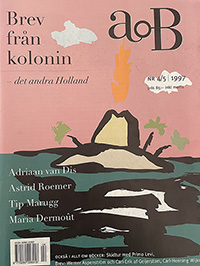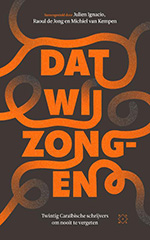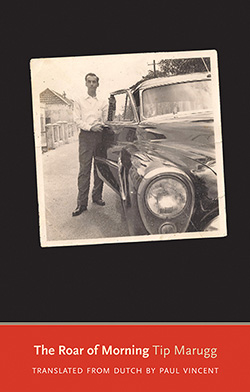Dutch-language Literature from Surinam and the Caribbean Area in Swedish translation
In 1997 literature from Flanders and the Netherlands was the guest of honour at the Gothenburg Book Fair which is the most important book fair in Sweden and possible also for the whole of Scandinavia. The most prominent Dutch-languages authors at this point in time, such as Harry Mülisch, Hugo Claus, Maarten ’t Hart, Tom Lanoye, were present at the fair and were highly promoted there by their Swedish publishers. However, various literairy magazines also paid attention to Dutch literature and one of them Allt om böcker (All About Books) focused on literature from the former Dutch colonies, i.e. Surinam, the Caribbean area and Indonesia, in the form of a special issues. Accordingly, we see a shift in interest away from the Eurocentric view of Dutch-language literature to other areas of the world.
Allt om böcker – beyond the European gaze

Brev från kolonin (Letter from the Colony) is the title of the special issue published by Allt om böcker. This title has more than one meaning and refers not only to Dutch-language postcolonial literature but also to the hugely popular singer in Sweden, Cornelis Vreeswijk (1937-1987). The Dutch-born Vreeswijk moved to Sweden as a 12-year-old and sang mainly in Swedish. He has has become nothing less than a national hero because of his music about Sweden and Swedish culture. One of his well-known songs is called Brev från kolonin, however, it has nothing to do with the Netherlands and colonial times. By way of using this title, the link with Vreeswijk and Dutch-language literature from the formal colonies is established in order to generate interest in it among Swedish readers without actually having to mention the name Vreeswijk. It is assumed that every Swedish reader makes this connection and understands the pun. Moreover, the link with Vreeswijk and his Dutch heritage, can also be subtly interpreted as "being different" in Swedish culture which is also traceable in the subtitle of the magazine’s title: det andra Holland (the other Holland).

In addition, this corresponds to one of the themes of the Dutch-language writers from Surinam and Curaçao which the Curaçaoan poet and novelist Frank Martinus Arion nicely puts into words: ‘Het is niet de wisseling van zijn en niet zijn waar het om gaat, maar de wisseling van zijn en anders zijn‘ (It is not the alternation of being and not being that matters, but the alternation of being and being different). (see Julien Ignacio, Raoul de Jong & Michiel van Kempen 2022:268).
Furthermore, this special issue consists of translated excerpts from novels by Astrid Roemer (De wereld heeft gezicht verloren) and Tip Marugg (De morgen loeit weer aan). There is also an interview with Astrid Roemer and an article entitled Voices from Curaçao in which the well-known authors Frank Martinus Arion, Boeli van Leeuwen and Tip Marugg are presented. Non of these authors had previously been translated into Swedish.
What happend next?
There was obviously some work put into promoting and creating interest in postcolonial Dutch-language authors in Sweden in 1997. For this reason, it is interesting to seek out to what extent the impetus of the magazine Allt om böcker to promote Dutch-language literature from the former colonies has lead to publishers taking further interest in translating this literature into Swedish? And what about the transnational circulation of Dutch-language from the former colonies in general which potentially could stimulate what has been translated into Swedish since 1997?
According to Heilbron (1999), Van Es & Heilbron (2015), the central languages of the world, i.e. English, German and French, often take on the role of transit languages for the translation of literature from one peripheral language to another, such as Dutch and Swedish. This is an established consecration path in the power dynamics of the cultures in the world. Hence, if a Dutch book is translated into English or German it is more likely for it to be translated into Swedish.
To begin with, let’s examine to what extend the renowned novelist Astrid Roemer (1947) from Surinam has been translated into the languages of the world. In total, eight of her novels have been translated into four languages: two in English (2020 & 2023 respectively), four in German (two of them in 2021 & 2023), one in Italian (2023), one in Portugese (expected in 2025). Roemer has of late been awarded two of the most prestigious prizes for Dutch literature: P.C. Hooft Prijs in 2016 and Prijs der Nederlandse Letteren in 2021. In her research, Broomans (2021:30) has pointed out that national award-winning authors are more likely to be translated and win awards internationally. This makes sense and probably explains the recent interest in Roemer’s books beyond the Dutch-language area. However, we do not see any translations yet into Swedish. Moreover, for such an acclaimed author one would expect an overal larger transnational circulation. We will have to wait and see wether more translations of her work will appear on the international bookmarket, also into peripheral languages.

Interestingly, the novel De morgen loeit weer aan (The roar of morning) by Tip Marugg (1923-2006) from Curaçao was translated into Swedish in 2023, 26 years after an excerpt appeared from this same book in Allt om böcker. There are no specific conclusions to be drawn here, when studying the transnational circulation of Marugg’s work, i.e. there is no main theme or related events to be found. The English translation of The roar of morning came out in 2015 and the German one in 1991. However, this might suggest that the Swedish author and translator, Per Holmer, was personally involved in the making of this translation, since he can be considered an important mediator of Dutch-language literature in Sweden.
Last but not least, the translation history of Frank Martinus Arion (1936-2015) and Boeli van Leeuwen (1922-2007) is also of interest here. They have never been translated into Swedish, nevertheless Arion has been translated twice into English as well as German, two central languages according to Heilbron (1999). Moreover, his most famous novel, Dubbelspel (Doubleplay) was translated in 2011 into Papiamentu and a second time into German in 2022. Regarding Van Leeuwen, there are only three translations of his work to date: two into English (1986 and 1995) and one into Spanish (1964).
All in all, the transnational circulation of these mentioned authors is somewhat disappointing when investigating the number of translations. Hopefully, the younger generation of authors will find its way to an international audience.
Double consecration – literature from the periphery
In a research project conducted by Lindqvist (2011) on the consecration of Caribbean literature in French, she launched the concept of double consecration. In order for French-language literature from the Caribbean to reach the world literature, this literature needed first of all to be consecrated in France before moving on to be translated into English and in the long-term perspective into more peripheral languages such as Swedish. Hence, this entails for a specific literature to be consecrated twice. If we look at the Surinamese and Caribbean literature in Dutch, this would entail that this literature has to be fully consecrated in The Netherlands before a second consecration internationally can occur. The question is whether Lindqvist’s concept of double consecration is applicable to the consecration process for Dutch-language literature from Surinam and the Caribbean? This has to be further investigated.
(Annika Johansson)
References
Broomans P (2021) Literary Prizes and Cultural Transfer. Barkhuis.
Dat wij zongen. Twintig Caraïbische schrijvers om nooit te vergeten (2022) Eds. Julien Ignacio, Raoul de Jong en Michiel van Kempen. Das Mag Uitgeverij.
Heilbron, J (1999) Towards a Sociology of Translation: Book Translations as a Cultural World-System. European Journal of Social Theory 2(4). SAGE Publications Ltd: 429–444. DOI: 10.1177/136843199002004002.
Lindqvist, Y (2011) Dubbel konsekration – en förutsättning för svensk översättning av utomeuropeisk litteratur? Maryse Condé som exempel. Språk och stil 21. pp. 140-170.
van Es N and Heilbron J (2015) Fiction from the Periphery: How Dutch Writers Enter the Field of English-Language Literature. Cultural Sociology 9(3). SAGE Publications: 296–319. DOI: 10.1177/1749975515576940
